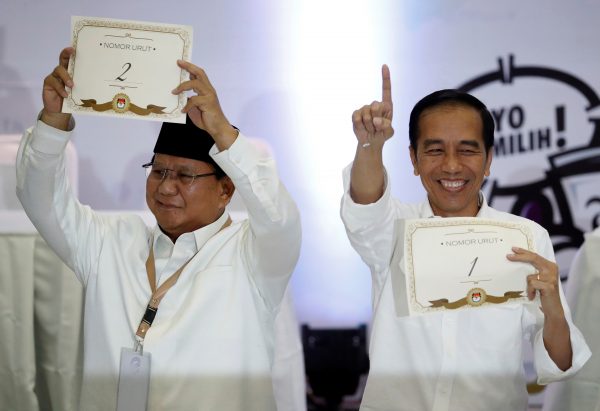This is an Indonesian national political achievement of considerable importance to a region that faces a vastly less certain world than that with which it has had to deal for many decades. To meet the challenges, Indonesia and its ASEAN partners will need to adopt a vigorous, proactive regional and global diplomacy with clear strategies for projecting core interests, as well as develop regional structures and arrangements through which these strategies can be advanced. A strong Indonesian democracy is a considerable regional and international asset in taking on these endeavours.
But as Edward Aspinall makes clear in this week’s lead essay, Indonesia’s democratic gloss is flakier the closer one looks at political machinations taking place ahead of President Joko Widodo’s fight for re-election. As Aspinall says there is, ‘a slow-moving but perceptible drift toward increasingly authoritarian measures — a trend that might be putting Indonesia’s democratic achievement at risk’. Not entirely confident of re-election despite strong poll numbers, ‘the government is increasingly turning to authoritarian measures to shore up its support and stymie its opponents’, with police ‘hampering the activities of some opposition groups’ and the military showing signs of becoming re-politicised.
Aspinall cautions against alarmism, emphasising that ‘[t]here has not yet been any fatal blow to Indonesian democracy’. But there is an emerging consensus among experts that Indonesian politics is heading in the wrong direction, conforming to a global trend whereby elected leaders transgress the limits of important democratic norms to shore up their political position.
Deeper social and political trends are also playing their part in shaping the terms on which Indonesia’s election is being fought. As Indonesian Muslims grow more pious, and in some ways more conservative, religion is has gained a bigger role in electoral politics. Jokowi, Greg Fealy observes, ‘has always felt vulnerable on religious issues’, having long been painted by Islamists as not sufficiently Islamic, and too friendly to minority interests. Following the defeat of his Chinese-Christian ally, Basuki Tjahaja Purnama (Ahok), in Jakarta’s 2017 gubernatorial election, ‘Jokowi intensified his efforts to cultivate Islamic support’, most recently by nominating a conservative cleric, Ma’ruf Amin, as his running mate for 2019.
This gradual trend towards a more Islamic political atmosphere might lead some to fret about what a more religiously conservative Indonesia means for its neighbours and the region. A more Islamic Indonesia will — the pessimistic narrative goes — find its foreign policy derailed by emotive religious issues.
Such concerns are probably overblown. Domestic politics will grow more conservative no matter who wins this year’s election; the Islamisation of Indonesian society has been a decades-long process, which politicians have adapted to, rather than caused. When it comes to working with the world, Indonesia’s elites are ultimately a pragmatic bunch where it matters. While an increasing number of Indonesian voters want a more ‘Islamic’ brand of politics in some areas, surveys still show that what they want most from their politicians are stable prices, jobs and decent government services.
Indeed, an election based on identity politics is not the one that President Jokowi wants to fight. He is himself not a religious conservative, and to the extent that he has made appeals to Islamic sentiment he has done it somewhat awkwardly and with political expediency foremost in his mind. The President would instead prefer to keep the focus on touting his record of infrastructure development, macroeconomic stability and the expansion of Indonesia’s nascent social safety net.
The centrality of economic concerns in electoral politics does not have uniformly good effects on policy. Economic nationalism has also loomed large ahead of the polls. As Rainer Heufers has recently noted, Jokowi has scrupulously avoided doing anything that opens him up to criticism of unduly favouring foreign investors and trading partners. Many of Indonesia’s policy settings leave the country more exposed than it needs to be to global economic turbulence, While Indonesia remains less exposed than many of its neighbours to fluctuations in global trade, the effects on the Rupiah caused by financial market jitters can have significant effects on domestic inflation, and thus on the government’s approval ratings.
Still, for some Indonesians it is the fear of Jokowi’s opponent that will drive them to unite behind the incumbent no matter what. Jokowi is once again being challenged by Prabowo Subianto, a former general who was once the son-in-law of Suharto. Prabowo stands accused of human rights violations during his military days, and has openly advertised his unhappiness with Indonesia’s democratic status quo. Prabowo has, so far, displayed little of the populist vigour that marked his 2014 campaign. Fealy speculates that his candidacy is more aimed at winning seats for his party, Gerindra, and thus influence in a re-elected Jokowi administration than serious presidential ambition.
Surveys show Jokowi comfortably in front at the beginning of the election campaign. But Indonesian elections often defy pollsters’ predictions. As election day draws near, Prabowo could gain ground rapidly, especially if economic circumstances are not favourable to the incumbent. What’s certain is that with Jokowi no longer considered the agent of change that so many hoped he would be in 2014, the stakes in 2019 seem lower than last time around for those invested in policy reform and democratic consolidation.
Yet for the rest of the region, with much now hanging on Indonesia’s weight and standing as a central balancing force in geopolitical affairs, these things loom larger than ever. A confident, well-grounded Indonesian democratic polity at the heart of ASEAN is key to navigating a tricky regional landscape and to Southeast Asia’s taking more control of shaping the pathway forward.
The EAF Editorial Board is located in the Crawford School of Public Policy, College of Asia and the Pacific, The Australian National University.

